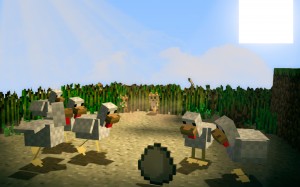 On the last night of Image’s Glen West Workshop earlier this month, after a moving concert by Over the Rhine and all manner of sniffling and hugging, Father Richard Rohr invited us to make spaces in our souls for worship.
On the last night of Image’s Glen West Workshop earlier this month, after a moving concert by Over the Rhine and all manner of sniffling and hugging, Father Richard Rohr invited us to make spaces in our souls for worship.
“How you live this moment is how you live your life,” he said. “How you do anything is how you do everything.”
His words nailed my heart to the floor.
I like to think I am “good” at worship. I often prepare myself by opening my hands, a posture that helps me focus. But my mind has a way of hairline-cracking within seconds: Do these people like me? Have they noticed my discolored tooth? On a scale of one to ten, how much of an idiot have I made myself today?
I like to think I lose myself in the beauty of God, but as my mind splinters and my prayerful hands go numb, I have to acknowledge that this moment of unrest reflects a life of unrest.
Am I who I say I am?
This is not a new idea, of course. The “anything/everything” quotation, attributed to ancient wisdom, self-help entrepreneurs, and basketball coaches, has been around the inspirational block. Then there’s the whole concept of existentialism—forming our identities through our actions and so forth. No matter. On this night, the Spirit shouted truth through a short bald man in a brown robe. Like a character from a Franciscan action movie, Father Rohr, with his kick-ass sweet smile, unleashed a full AK-47 of love and exhortation.
And this time, it was personal.
I thought about Father Rohr’s words when I returned home. I may describe myself as an attentive wife and mother. But until now, my family life has been constructed of moments of procrastination. I will always have this little boy asking me to read a book. I’ll do it tomorrow night. My husband passes through the kitchen several times a day. I can put down these dishes and kiss him anytime.
How I do anything is how I do everything.
I may say I’m patient and compassionate, but a few days ago, when the woman behind me at the gas station honked because I hesitated turning left, I threw up my hands, peeled out to the right, and made an illegal U-turn to prove my point that I couldn’t turn left. All this with my daughter in the car.
“I just did something angry,” I told her a few minutes later. “Right now, I’m an angry person. I don’t think I am, but I do things like this a lot.”
“Um huh.”
It concerns me that she didn’t even notice.
This is not about my being too hard on myself; it’s about living the life I want to live—that is, imitating Christ. Faith in Christ doesn’t ask much, Father Rohr told us. Following him demands everything.
I want to enlarge my soul by reading, but an increasing number of my nights have been made up of Facebook and Buzzfeed moments, not book moments. So I’m cutting out the internet at bedtime.
I want to love my new neighbors, but every time I look at the muddy trenches their sons cut in my front lawn with their bikes, I stomp and huff like an animatronic dinosaur. So I’m training myself to look at those tracks and pray for the towheaded boys.
As I write, my lanky tween daughter lolls on the couch with her tablet, playing the infernal Minecraft. All summer, my children have obsessed over this video game in which they build constructions out of cubes. Mom! Look at this zombie, this roller coaster, this tunnel, this beach! I have no idea what I’m looking at, and even when I try, the laundry pile and garden press at the corners of my eyes. As the kids narrate their digital journeys in preposterous detail, I want to claw out of my skin.
Their lives are made of Minecraft moments. They are Minecraft players. Right now, this is important.
My daughter coaxes the square chickens squawking on her screen: “Get back in the pen, you beasts!”
“You know, I’m trying to write,” I say.
She is only eleven, but with her sophisticated vocabulary and 5’5” frame, carries herself with the grace of a college student. Her long, sun-bleached hair drapes her arms. She recently asked if she can shave her legs.
She will not always lie willingly on the couch next to me. I want to be a mother who takes interest in her children for who they are. My father has stated a handful of times that he’s proud of my writing, but decades of collected actions and comments have belied a marked distaste. Do I want my kids to see me this way when I’m eighty years old?
Who we say we are versus who we really are. We have just this moment to fix it.
“Show me these crazy chickens,” I say. My daughter glances at me, skeptical. Then she smiles and scoots over, tilting her world toward my face.
Tania Runyan is the author of the poetry collections Second Sky (Cascade Poiema Series), A Thousand Vessels, Simple Weight, and Delicious Air, which was awarded Book of the Year by the Conference on Christianity and Literature in 2007. Her book How to Read a Poem, an instructional guide based on Billy Collins’s “Introduction to Poetry,” was recently released by T.S. Poetry Press. Her poems have appeared in many publications, including Poetry, Image, Books & Culture, Harvard Divinity Bulletin, The Christian Century, Atlanta Review, Indiana Review, and the anthology In a Fine Frenzy: Poets Respond to Shakespeare. Tania was awarded an NEA Literature Fellowship in 2011. She tutors high school students and edits for Every Day Poems and Relief.















